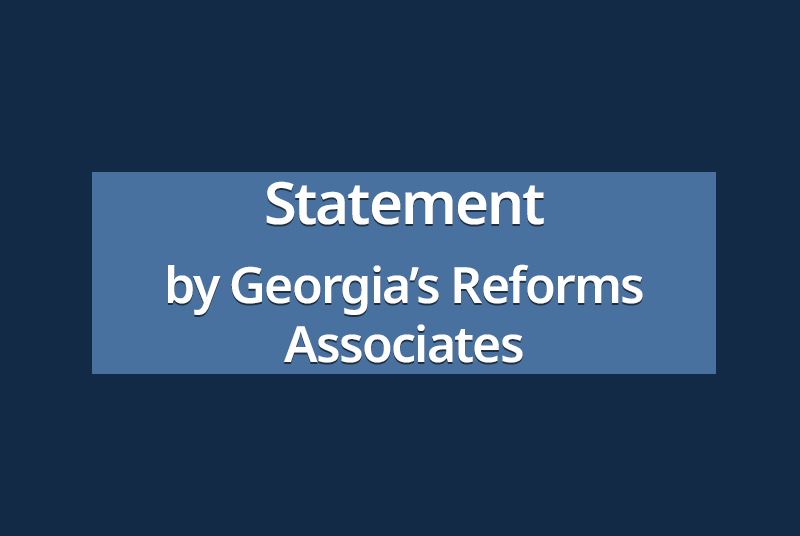Georgian NGOs’ address to the European Court of Human Rights
06 March, 2017
0
We, the signatory NGOs, consider it necessary to make this joint declaration regarding interim measures on Broadcasting Company – Rustavi 2. As it was made available for the public, European Court of Human Rights will decide on the prolongation or termination of interim measures issued on March 3, 2017 by the duty judge. We urge the Court to maintain the interim measure under Rule 39 until the Court will be in a position to consider the case on the merits.
Considering the fact that NGOs have closely observed and monitored the case proceedings in domestic courts, we think it is important to appeal to the European Court and underline for respective problems. Additionally, we would also like to draw the Court’s attention to the significance of keeping the TV Company’s current ownership unchanged since the editorial policy of the broadcaster strongly depends on it.
The monitoring of the case provides grounds to claim with assurance that the principle of fair trial have been breached throughout the proceedings. Signing organizations do greatly appreciate and respect the right to property. However, even though at the national level this case was (nominally) represented as a dispute between two private parties over property ownership, it left clear impression that the government has been attempting to take control over the main opposition media outlet, which would significantly damage media pluralism and democracy in Georgia.
Main grounds for such conclusions are as follows:
● There have been suspicions about the political context being attached to the case since the beginning of proceedings in domestic courts. These suspicions about political motivations have not been shed but enhanced as the hearings proceeded. The NGOs’ expressed concern over the interim ruling of the first instance court, which contested the editorial policy of the independent TV company and appointed temporary manager with the possibility to influence, among other things, editorial policy. There were questions about the extremely rapid pace of proceedings in the City and Appellate courts as well. All the while, NGOs have pointed out the unjustified restriction of procedural rights of Rustavi 2 by the courts.
● At every stage of the case there have been questions regarding the independence and impartiality of the judges. More specifically, at the first instance the court doubts were raised that the launching of criminal prosecution against the mother of presiding judge may have been used for exerting pressure on him. The attorneys of Rustavi 2 asked for judges’ recusal at the Appellate court as well, for the doubts that the government authorities were pressuring certain judges. Also, criminal investigation has been launched by the Prosecutor’s Office over an alleged gross interference in adjudicating process of two members of the Grand Chamber of the Supreme Court. The case was made public by Rustavi 2.
● During the process the Rustavi 2 appealed to the Constitutional Court and requested unconstitutionality of certain legal norms that could influence result in the common courts. At this very moment the government initiated amendments in the legislation on the Constitutional Court. Despite the very critical opinions of the Venice Commission and the NGOs, the government adopted these legislative changes. It is important to note that the changes have disrupted the effective functioning of the court and hindered the decision making on the Constitutional claims of Rustavi 2.
Besides the legal matters, it is also important to note that Rustavi 2 is critical to the government and at the same time it is the most-watched private TV Company in Georgia. High level government officials often did not refrain from openly criticizing the broadcaster because of its critical editorial policy.
The change of the editorial policy of Rustavi 2, following the March 2, 2017 decision of the Supreme Court of Georgia, could prove to be a decisive blow for the free media. In Georgia this will likely cause irreparable damage to the pluralistic media environment in the country which, in itself, will have an extremely negative impact on the country’s democratic development.
We would also like to draw the Court’s attention to the fact editorial policy of the broadcaster and its independence might be at high risk should the ownership of the Rustavi 2 change.
Lastly, special emphasis should be given to the context element. Current ruling government in Georgia has constitutional majority in the parliament, which ultimately diminishes and weakens the mechanisms for checks and balances in the country. In this scenario, the role of media is of outmost importance for the democratic control and accountability.
Transparency International Georgia
Georgian Young Lawyers’ Association (GYLA)
International Society for Fair Elections and Democracy (ISFED)
Open Society Georgia Foundation (OSGF)
Media Development Foundation
The Georgian Charter of Journalistic Ethics
Georgian Association of Regional Broadcasters (GARB)
Georgian Democracy Initiative (GDI)
Human Rights Education and Monitoring Center (EMC)
Atlantic Council of Georgia
Georgia’s Reforms Associates
Society and Banks
Union Sapari
Tolerance and Diversity Institute (TDI)
Equality Movement
Regional Centre for Strategic Studies
Georgian Strategic Analysis Center
Partnership for Human Rights (PHR)
Baltic to Black Sea Alliance (BBSA)
In Depth Reporting and Advocacy Center
Institute for Democracy and Safe Development (IDSD)
Foundation for civic education
Article 42 of the Constitution
Mediaclub
Association Green Alternative
The Economic Policy Research Center
Institute for Development of Freedom of Information
UN Association of Georgia
Civil Development Agency



